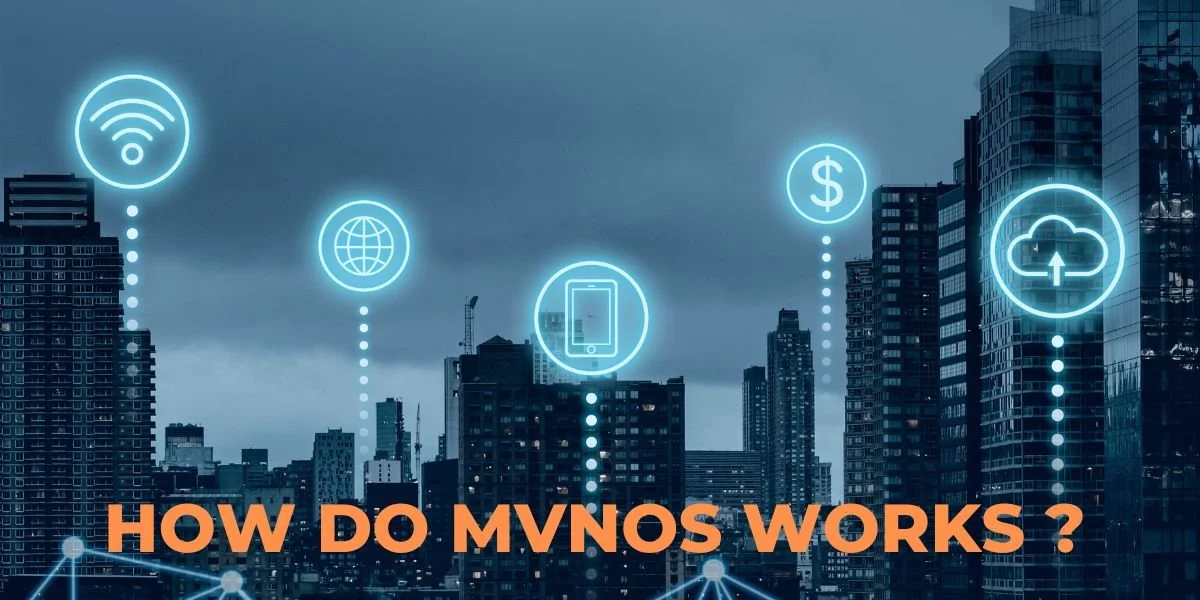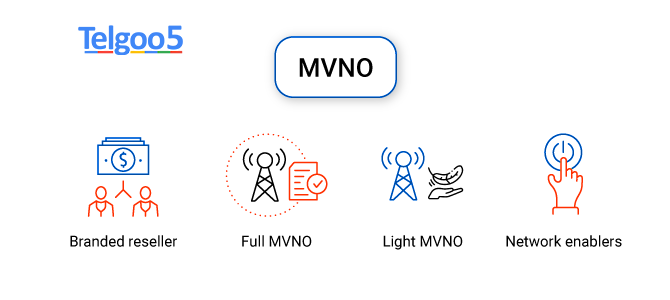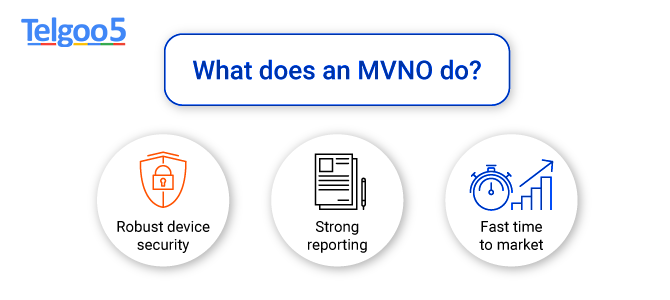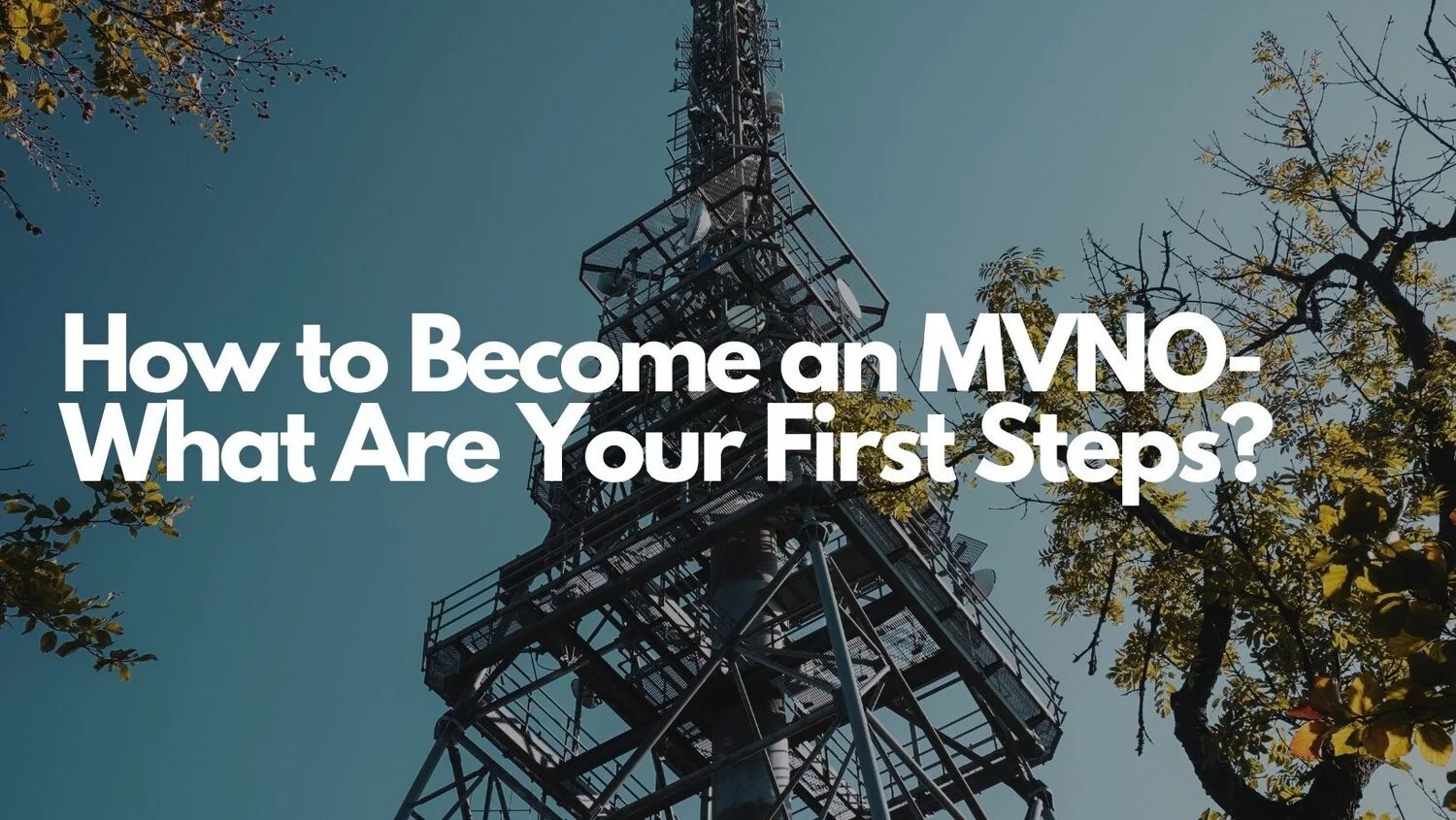How Do MVNOs Work?
Mobile Virtual Network Operators (MVNOs) are companies that offer mobile services, such as voice and data plans, without owning the underlying network infrastructure. Instead, MVNOs lease network capacity from one or more mobile network operators (MNOs), such as AT&T, Verizon, or T-Mobile, and then rebrand and sell that capacity to their customers. In this way, MVNOs are able to offer competitive pricing and tailored services without the significant investments required to build and maintain their own networks.
Three criteria are commonly used to classify MVNOs
Yes, MVNOs are often classified based on three criteria:
Business Model: MVNOs can operate as service resellers, which means they simply resell the services of a single MNO, or as full MVNOs, which have more control over the services they offer, including pricing, branding, and customer management.
Customer Segment: MVNOs can target specific customer segments, such as budget-conscious consumers, business customers, or ethnic groups, and tailor their services accordingly.
Service Offering: MVNOs can focus on offering specific services, such as voice, data, or both. Some MVNOs also offer value-added services, such as international calling or roaming, that are not typically included in traditional mobile plans.
By using these criteria, MVNOs can differentiate themselves from the traditional MNOs and offer unique and customized mobile services to their customers.
Mobile Virtual Network Operators offer the following connectivity services
Mobile Virtual Network Operators (MVNOs) typically offer the following connectivity services to their customers:
Voice Calls: MVNOs offer voice call services, allowing customers to make and receive calls using their mobile devices.
Text Messaging: MVNOs also offer text messaging services, allowing customers to send and receive text messages.
Mobile Data: MVNOs offer mobile data services, which allow customers to use the internet, browse websites, and use data-intensive applications, such as streaming music or video.
Mobile Broadband: Some MVNOs offer mobile broadband services, which provide high-speed internet connectivity for laptops and other devices using a mobile data connection.
International Roaming: Some MVNOs offer international roaming services, allowing customers to use their mobile devices while traveling abroad.
Mobile Hotspot: MVNOs also offer mobile hotspot services, which allow customers to share their mobile data connection with other devices.
By offering these services, MVNOs provide a comprehensive mobile experience for their customers and offer alternative options to traditional mobile services.
Now that we know how MVNOs work and the services they provide, let us look at a few examples of Mobile Virtual Network Operators
Summary:
Mobile Virtual Network Operators (MVNOs) are companies that offer mobile services, such as voice and data plans, without owning the underlying network infrastructure. They lease network capacity from one or more mobile network operators (MNOs) and rebrand and sell that capacity to their customers.
MVNOs are classified based on their business model, customer segment, and service offering. They offer a variety of connectivity services, including voice calls, text messaging, mobile data, mobile broadband, international roaming, and mobile hotspot services. MVNOs provide a cost-effective and flexible alternative to traditional mobile services and target specific customer segments with tailored services. Examples of MVNOs include Boost Mobile, Virgin Mobile, TracFone, Google Fi, and Metro by T-Mobile.
What is a mobile virtual network operator (MVNO)?
A mobile virtual network operator (MVNO) is a telecommunications service provider that offers mobile phone services, but does not own the infrastructure to provide them. Instead, MVNOs purchase network services wholesale from one or more mobile network operators and then rebrand and sell these services to customers under their own name.
A mobile virtual network operator (MVNO) is a telecommunications service provider that offers mobile phone services, but does not own the infrastructure to provide them. Instead, MVNOs purchase network services wholesale from one or more mobile network operators and then rebrand and sell these services to customers under their own name. This allows MVNOs to offer competitive mobile phone plans and services without having to invest in the expensive infrastructure required to support a mobile network.
What makes a mobile virtual networks operator unique?
A mobile virtual network operator (MVNO) is unique in the following ways:
Rebranding: MVNOs purchase network services from mobile network operators and rebrand the services under their own name, creating a unique customer experience.
Independent pricing and plans: MVNOs have the flexibility to offer their own pricing and plans, separate from the mobile network operators they purchase services from.
Targeted demographics: MVNOs often target specific demographics, such as budget-conscious consumers, seniors, or specific ethnic groups, with tailored services and plans.
Reduced infrastructure costs: MVNOs do not need to invest in the infrastructure required to support a mobile network, reducing their overhead costs and allowing them to offer more competitive prices.
Faster service and product innovation: MVNOs can be more agile and flexible in introducing new services and products, as they do not need to invest in upgrading their own infrastructure.
These unique characteristics make MVNOs a popular alternative for consumers looking for more affordable and customized mobile phone services.
What does an MVNO do?
A mobile virtual network operator (MVNO) provides mobile phone services to consumers, but does not own the infrastructure to support these services. Instead, an MVNO purchases network services wholesale from one or more mobile network operators and then rebrands and sells these services to its customers under its own name. An MVNO is responsible for the following activities:
1. Marketing and customer acquisition: MVNOs market and sell their services to their target customers.
2. Customer service and support: MVNOs handle customer service and support for their subscribers, including billing, technical support, and troubleshooting.
3. Network management: MVNOs manage the network services they purchase from mobile network operators to ensure reliable and high-quality coverage for their customers.
4. Plan and pricing management: MVNOs set their own pricing and plans for their customers, offering a unique and customized experience.
5. Mobile phone and device sales: MVNOs may also sell mobile phones and devices to their customers, either directly or through partnerships with manufacturers.
In summary, MVNOs are responsible for the end-to-end customer experience, from marketing and customer acquisition to customer service and support, all while leveraging the network infrastructure of mobile network operators.
Why do mobile network operators need MVNO?
Mobile network operators partner with mobile virtual network operators (MVNOs) for several reasons, including:
1. Increased revenue: MVNOs purchase network services wholesale from mobile network operators and rebrand and sell these services to their own customers. This provides mobile network operators with additional revenue from the sale of network services to MVNOs.
2. Customer acquisition and retention: MVNOs can target specific customer segments, such as budget-conscious consumers, seniors, or specific ethnic groups, and help mobile network operators reach and retain these customers.
3. Better use of excess network capacity: Mobile network operators often have excess network capacity, and partnering with MVNOs helps them make better use of this capacity, improving their overall utilization and efficiency.
4. Increased brand exposure: MVNOs can promote and advertise the mobile network operator's brand, increasing its visibility and exposure in the market.
5. Innovation: MVNOs can introduce new services and products more quickly and easily than mobile network operators, providing a way for the latter to stay innovative and competitive in the market.
Overall, MVNO partnerships can help mobile network operators increase revenue, reach new customers, improve network utilization, increase brand exposure, and drive innovation.
What kind of MVNOs are there?
There are several types of mobile virtual network operators (MVNOs), including:
1. Discount MVNOs: These MVNOs target budget-conscious consumers with low-priced plans and services, often using the network of a single mobile network operator.
2. Niche MVNOs: These MVNOs target specific customer segments, such as seniors, ethnic groups, or travelers, with tailored services and plans.
3. Full-service MVNOs: These MVNOs offer a full range of mobile phone services, including voice, data, and text, and often partner with multiple mobile network operators to ensure broad coverage.
4. Data-focused MVNOs: These MVNOs focus on providing high-speed data services, such as mobile internet and hotspot services, to their customers.
5. Branded MVNOs: These MVNOs are often owned by large brands, such as supermarkets or cable companies, and offer mobile phone services under their own brand name.
6. Enterprise MVNOs: These MVNOs cater to the needs of businesses and organizations, offering customized mobile phone plans and services for their employees.
Each type of MVNO offers a unique set of services and plans, targeting different customer segments and providing a competitive alternative to traditional mobile network operators.
What do MVNOs need to be competitive?
To be competitive, MVNOs (Mobile Virtual Network Operators) need the following key elements:
1. Cost-effective network access: MVNOs need to secure a reliable and cost-effective access to a mobile network from a host carrier, often at wholesale rates.
2. Unique Value Proposition: MVNOs need to differentiate themselves from other providers by offering a unique value proposition to their customers, such as lower prices, specialized services or targeted customer segments.
3. Strong Brand: MVNOs need to have a strong brand that resonates with their target customers, and effective marketing to reach and retain them.
4. Good customer service: MVNOs need to provide high-quality customer service to ensure customer satisfaction and loyalty.
5. Flexible business model: MVNOs need to have the ability to quickly adapt to changing market conditions and customer demands, with a flexible business model that allows them to offer new services and packages as needed.
6. Effective back-end operations: MVNOs need to have an effective back-end operation, including billing, customer service, and network management, to support their customer-facing activities and ensure a seamless customer experience.
The Relationship Between MVNOs and MVNEs | Full Guide
Telgoo5 offers both MVNO and MVNE services to small and medium-sized telecom companies. Contact Telgoo5 today to learn more.
To create and run a successful MVNO business, you have to take care of several responsibilities. Offer personalized services to users. Execute effective marketing strategies. Keep up with the contract with your MNO. Data analysis. And so on.
For most small to medium-sized MVNOs, these duties are too much to handle. They have two choices. Either work with many third-party companies and essentially endanger customer data, or hire an MVNE to take care of all administrative duties and focus on selling personalized offers to customers.
We will break down what MVNOs and MVNEs are and the relationship between the two. Let's get started.
What Is an MVNO?
An MVNO is a network operator who buys bulk telecom services from an MNO and resells them to users. An MVNO is usually focused on providing very personalized and streamlined services to customers.
Verizon and T-mobile are examples of MNOs that sell network infrastructure to MVNOs like Virgin Mobile and Walmart Mobile.
Some MVNOs are extensive enough to offer the full range of telecom services from voice to data connectivity. These companies, called full MVNOs, develop their billing systems, produce their own SIM cards, and manage their charging systems.
Light MVNOs depend on the MNO to take care of connectivity. All they do is provide niche services and marketing to their audience.
What Is an MVNE?
MVNE stands for Mobile Virtual Network Enablers. These telecom companies work with MVNOs to ensure the smoothness of service. They are there to make life easier for the startup MVNO.
Remember the reason why MVNOs are in the market in the first place. They are there to provide niche and personalized services that the large MNO cannot offer its users.
An MVNO, especially a full one, has several responsibilities, including providing connectivity services, tariffs, personalized services, and customer support.
Many MVNOs cannot handle it all, so they reach out to MVNEs to help. MVNEs take care of the customer support and the administrative work for the MVNOs. This frees the MVNOs to focus on developing streamlined offers for their users.
It's common to find one MVNE working with several MVNOs.
Benefits of Working With an MVNE
1. A Reliable Online Charging System
MVNOs now use online charging systems to bill customers accurately. Online charging systems bill customers in real-time, which allows for greater transparency and an increase in customer trust.
The thing is, most MVNOs cannot invest in creating their own OCS solution. On the other hand, MVNEs have OCSs already in place.
It's cheaper and easier for the MVNO to hire an MVNE to take care of charging customers.
2. Specialized Customer Service
As an MVNO grows and acquires more customers, the need for a systematized customer service center becomes more urgent. A startup MVNO either creates a new department and hires many support reps or outsources to a third-party company.
An MVNO should outsource customer service to an MVNE because they have staff specifically trained to cater to telecom users. Hiring an MVNE to care for customer service saves an MVNO money and time.
3. Reduced Spending Costs
The MVNE takes on all the administrative duties of an MVNO, which saves the MVNO from spending money to recruit more staff and take care of billing, customer support, and data analysis.
Telgoo5 offers both MVNO and MVNE services to small and medium-sized telecom companies. Contact Telgoo5 today to learn more.
The Complete Guide to MVNOs and the Services They Provide
Telgoo5 sets up MVNOs for businesses and service centers. Feel free to browse our full range of options.
Introduction to MVNO
Think of a large Mobile Network Operator like Sprint. Sprint owns cell towers and antennas, and directly sells network connectivity to users. Then, think of a smaller network like Tello. Tello does not own network infrastructure. Instead, it buys "space" in bulk from Sprint and resells to users. Tello is an MVNO.
MVNO stands for Mobile Virtual Network Operator. MVNO is a network operator that buys access from an MNO, and then resells to consumers. The first MVNO was launched in the UK and quickly became popular because of cheaper rates and better targeting.
MVNOs are partly or fully owned by MNOs. In other words, while some MVNOs have exclusive agreements with single MNOs, others buy network access from multiple MNOs.
Different Types of Services Offered by MVNOs
The services provided by an MVNO are dependent on which kind it is. Here are the four main types of MVNOs.
Full MVNOs
The only thing that full MVNOs get from an MNO is connectivity, that is, access to network antennas. Full MVNOs develop and manage their core network infrastructure and billing systems. They manufacture their own SIM cards and manage call flows and data flows. They develop and sell network services. In addition to doing these, they also take care of customer relations and branding.
Light MVNOs
Light MVNOs have no business with managing connectivity. It's MNOs that take care of that. Light MVNOs are only concerned about their customers. They throw weight behind customer relations, branding, niche services, and marketing. Light MVNOs are perfect for service and branding-oriented businesses looking to service an underserved niche.
Branded Resellers
Branded Resellers, also called reseller MVNOs, operate by selling access to an already existing customer base. What they do is sign a contract with an MNO, either use the same brand or rebrand to a new MVNO, and then resell the MNO services to their audience.
The main thing branded resellers do is sales, distribution, and marketing. The MNO remains in full control of network services and tariffs, while the reseller MVNO worries about selling to more users.
Is it Worth Switching to an MVNO?
Fewer service costs
The main attraction of MVNOs is that they offer lower-cost services. They buy from the MNOs and resell at cheaper prices.
It works this way. An MNO often has a broad customer base. In trying to offer a solid service to everyone in their base, MNOs have services that are broad, inflexible, underused, and overpaid. MVNOs focus on a smaller niche, customize their offerings, and so sell at cheaper prices.
Customized services
MVNOs focus on a smaller number of users and are concerned with segmenting their customer base to offer personalized services. Even though MVNOs have the disadvantage that MNOs prefer their direct users to MVNO users, it rarely happens that a situation occurs where a network has to choose who to service.
How Do I Choose Which One is Best for me?
The best way to select an MVNO is to think of your business needs. Find an MVNO that suits your preferences, and has a solid track record.
Telgoo5 sets up MVNOs for businesses and service centers. Feel free to browse our full range of options.
5 Ways MVNOs Impact Your Business
An MVNO, or a Mobile Virtual Network Operator is a communication provider that does not actually own wireless network infrastructure. MVNOs purchase bulk access to infrastructure, and make it available to their own clients.
When it comes to purchasing wireless communication, most businesses do not know where to start. All they know is that they need reliable Internet and phone services to support their business. Cursory research into wireless communication providers reveals too many acronyms and technical terms to understand, and most businesses wind up going with a sub-par solution just to cross the item off of their to-do list. Instead of throwing in the towel, consider using an MVNO for wireless communication.
An MVNO, or a Mobile Virtual Network Operator is a communication provider that does not actually own wireless network infrastructure. MVNOs purchase bulk access to infrastructure, and make it available to their own clients. Most MVNOs are complete businesses with their own marketing, sales, customer support, and billing platforms. In fact, you may purchase wireless communication through an MVNO without even realizing it.
Below are 5 ways MVNOs may impact your business:
MVNOs negotiate rates. As a business, you probably do not have the time or ability to negotiate with wireless network infrastructure owners on your own. All you know is that you need wireless communication, and you need it at a reasonable rate. MVNOs purchase access in bulk, which means they do the rate negotiation for you. They then present you with prices and packages that your business can utilize. Every day, MVNOs save businesses time and effort by negotiating bulk rates before repacking it for their clients.
MVNOs handle wholesale variables. If anything changes at the wholesale level, an MVNO will understand it and handle it, keeping your business completely insulated from changes in the market. Wireless communication is a dynamic market, which means that MVNOs commit to staying on top of significant changes so that their clients do not have to.
MVNOs offer simple billing. The use of wireless communication can vary drastically over any given day, week, month, or year. This can make billing very complicated. In contrast, MVNOs purchase bulk access to wireless communication infrastructures, and often pass that type of purchasing on to their customers. With an MVNO you are paying for access at a negotiated rate. You are not accountable for every single minute of communication you use. This makes billing simple and easy to understand.
MVNOs can tailor their packages to your needs. Since MVNOs do not need to maintain their own networks, they have the freedom to create more tailored solutions for their clients. They have the funds and the resources to create custom packages, which makes them a fantastic option for most businesses.
MVNOs provide a better customer experience. As a reseller, MVNOs have the capacity to dedicate significant resources to customer care and support. You are more likely to get personal, dedicated support from an MVNO than from an MNO (Mobile Network Operator).
So if your business needs inexpensive, highly customized, well-supported wireless communication, consider purchasing through and MVNO. The hard part is simply remembering what MVNO stands for. The rest is easy. So contact an MVNO today and get your business communication off the ground in no time.
What makes a successful MVNO
Mobile Virtual Network Operators (MVNOs) play a crucial role in the market. They operate as the middlemen between mobile network operators who own wireless network infrastructures, and the end users who want to access wireless communications services.
Mobile Virtual Network Operators (MVNOs) play a crucial role in the market. They operate as the middlemen between mobile network operators who own wireless network infrastructures, and the end users who want to access wireless communications services. Every day, people rely on MVNOs to place calls without even realizing it. The mark of a good MVNO is its ability to reliably and seamlessly provide services such that all but the most savvy customers do not even realize that they are a part of the service equation. If you are considering entering the MVNO space, it is important to understand what success looks like, and the steps you will need to take in order to be successful.
Here are three more qualities that make a successful MVNO:
Reliability:
Frustration surrounding dropped calls is largely universal. When people today pick up their phones to make a call, they are not thinking about the incredible technology that allows them to reach anyone, anywhere, at any time. They do not consider the satellites circling the globe, the wireless network infrastructures that had to be created, or how that infrastructure is leveraged in a way that allocates network connection to them. MVNOs fit into that last and final part of the equation. They ensure that the technology and infrastructure that supports wireless communication is actually delivered to the end user in ways that make them usable. Technology and infrastructure do an end user no good if they cannot access it and use it. A good MVNO ensures connection every single time - without fail and without interruption.
Cost-Effectiveness:
By purchasing bulk access to network services at wholesale rates, MVNOs can provide customized service at price points that work for their target markets. For example, the big 4 providers (AT&T, Verizon, Sprint, and T-Mobile) may not offer customized plans at the same level that MVNOs can. If your target market is price sensitive, as an MVNO you can slice and dice services in a way that is less expensive to the end user, and will therefore drive them to choose you over a large provider.
Strong Relationships:
Successful MVNOs maintain fantastic relationships with the mobile network operators they purchase from. The fact is that MVNOs cannot exist without MNOs, so it is important for MVNOs not to bite the hand that feeds. Strong relationships led to better rates, quicker problem solves, and more services that MVNOs can eventually pass on to their clients. MVNOs that breed tension with MNOs do not last very long in the marketplace. This space is competitive, so in order to ensure success MVNOs have to network effectively.
How Telgoo5 Supports MVNOs:
Telgoo5’s modular platform offers an Omni Channel CRM, billing, online charging, and a payment engine that drives many of the global brands in the MVNO space. We handle business logistics so that MVNOs do not have to. We support connections between MVNOs and their target audience, and we are so effective that most end users do not even realize we are there. If you are looking to launch and/or maintain a successful MVNO, you need to work with Telgoo5.
How to Become an MVNO- What Are Your First Steps?
Starting a MVNO can be quite lucrative, but it is not easy. Set yourself up for success by researching exactly what goes into starting and MVNO, and starting off with a solid plan and strong partners.
Starting a MVNO can be quite lucrative, but it is not easy. Set yourself up for success by researching exactly what goes into starting and MVNO, and starting off with a solid plan and strong partners.
Mobile Virtual Network Operators (MVNOs) provide services to subscribers without needing any radio access network equipment. They are virtual operators only. This means that becoming a MVNO is much easier than it would be should it require any speciality equipment. It is a great option for companies looking to enter the provider space without a significant investment. The first step in becoming a MVNO is establishing a relationship with an MNO (or mobile network operator). Once a roaming agreement is in place, the next step is determining what type of MVNO you want to be.
What kind of MVNO does your company want to be?
Skinny MVNO: This type of company is lean and mean. A skinny MVNO does not own or operate any of their own equipment. They establish a strong relationship with an MNO and simply own their customer service/support, sales, and marketing.
Light MVNO: This is a slightly more significant type of MVNO. They still rely on a strong relationship with an MNO, but in addition to owning customer support, sales, and marketing, they also control the distribution operations of their service and can set their own service prices.
Think MVNO: Now we are moving into a more full-service provider. This type of company supports their customers with their own infrastructure. They own their own GMSC (Gateway Mobile Switching Center) for voice, GGSN (gateway GPRS support node) for data, subscriber services, and an independent billing system.
Full MVNO: This type of MVNO owns their own core network infrastructure. The only thing they lack is their own radio network, for which they still need a relationship with an MNO.
Once you have determined which type of MVNO is right for you, the next step is defining your target market.
Different market segments have different needs and wants. For example, a community of individuals who are 65+ may not have a huge need for data and texting services. In contrast, a millenial or gen Z audience are going to expect a plan with a lot of data availability. Once you have figured out your target market, you can build a business plan.
Lastly, find reliable partners to handle back office outsourcing needs.
Telgoo5 is a fantastic mobile virtual network enabler. We have years of experience helping MVNOs grow and scale. We can handle billing, customer issues, security, and infrastructure. Once you have your plan in place, allow us to help you to implement.
Telgoo5 is an end-to-end cloud based SaaS platform that powers telecommunication services to MSPs, MNOs, MVNOs, MVNEs, and MVNAs. We are established, reliable, and a fantastic partner for you. Whether you are looking to enter this space as a newbie, or an experienced MVNO operator, Telgoo5 is the right partner for you.

















